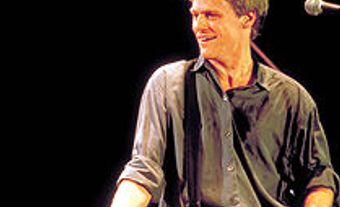André Gagnon, OC, OQ, pianist, composer, conductor, arranger, actor (born 2 August 1936 in St-Pacôme-de-Kamouraska, QC; died 3 December 2020). André Gagnon was renowned for an eclectic mix of pop and classical music. He worked as accompanist, conductor or arranger for some of the great Quebec chansonniers before his career as a soloist. His compositions span a wide variety of musical styles and were especially popular in Japan. He won Juno Awards for his records Saga (1974) and Neiges (1975), and as best instrumentalist (1977 and 1995). He received the Prix Félix for instrumental album of the year 12 times between 1978 and 2017 and was awarded SOCAN’s William Harold Moon Award for his contribution to Canadian music. He was made an Officer of the Order of Canada and an Officier of the Ordre National du Québec.
Early Years and Education
André Gagnon played the piano as a child and began writing short pieces at age six. He took theory lessons with Léon Destroismaisons in Ste-Anne-de-la-Pocatière (1952–53 and 1957). From 1957 to 1961, he studied at the Conservatoire de musique à Montréal (CMM) with Germaine Malépart (piano), Clermont Pépin (composition), and Gilberte Martin (solfège). At the same time, he developed an interest in popular music. In 1961, he received a premier prix harmony from the CMM. That same year, on a grant from the Quebec government, he studied in Paris with Yvonne Loriod and took courses in accompanying and conducting.
Career as Accompanist
On his return to Canada in 1962, Gagnon became the accompanist for Claude Léveillée. He was music director, arranger and pianist for most of Léveillée's recordings until 1969. He also accompanied Jacques Blanchet, Pierre Calvé, Renée Claude, Claude Gauthier, Pauline Julien, Pierre Létourneau, and Monique Leyrac, among others. He also arranged several songs for Leyrac. In 1967, he was the soloist in a Mozart concert conducted by Raymond Dessaints at Place des Arts (PDA).
Solo Career
In 1969, André Gagnon gave up accompanying to devote himself to a career as soloist, composer, and arranger. He recorded Mes Quatre Saisons in the style of Vivaldi, based on themes drawn from the songs of Jean-Pierre Ferland, Félix Leclerc, Claude Léveillée and Gilles Vigneault. Gagnon was among the artists chosen to represent Canada at Expo 70 in Osaka, Japan. That same year, he toured Quebec with the Quebec Symphony Orchestra. In 1972, he gave a concert of his works at the PDA with the McGill Chamber Orchestra. He performed in France in 1975 and 1976 and Mexico in 1976. His name appeared on many hit charts.
In 1978, he presented a show at Massey Hall in Toronto and at the PDA. Subsequently he toured Quebec and other provinces and 10 US cities (1979). In the spring of 1981, Gagnon participated in a series of concerts with the Vancouver Symphony Orchestra. In the next few years, he performed in Venezuela, Mexico, Rumania and Greece. In 1983, he recorded Impressions with the National Philharmonic Orchestra of London, and performed Mozart’s Concerto No. 22 with the Montreal Symphony Orchestra under Charles Dutoit. He joined Claude Léveillée at the PDA in a show of their classic hits.
In 1986, after touring Australia, Gagnon performed at the Spectrum in Montreal. He then took part in a symphonic concert at Ontario Place in Toronto, followed by concerts in Ottawa and Quebec City. In 1989, he played in Tokyo with the Tokyo Symphony Orchestra under Kazuyoshi Akiyama. Gagnon developed a large following in Japan over the next 15 years. He recorded and re-released many albums for the Japanese market under the RCA Victor label. He first toured that country in 1991, returning seven times between 1996 and 2003. He recorded his Noël album with the Prague Philharmonic Orchestra in 1992. He collaborated again with the National Philharmonic Orchestra in 1994, recording Romantique.
Compositions and Television Work
Many of André Gagnon’s works have been performed by renowned ensembles. Tango was recorded by the Orford String Quartet. “Rencontre est-ouest” on poems by Albert Lozeau, commissioned by the Tudor Singers of Montreal, was premiered by the latter in 1984. His romantic opera Nelligan (libretto by Michel Tremblay) was performed at the Opéra de Montréal in 1990 and recorded on CD. Gilles Ouellet later completed a symphonic orchestration. Nelligan was performed again in 1995 by the MSO under Jacques Lacombe at PDA in Montreal.
On CBC TV, Gagnon was host and accompanist for the program Cri-Cri (1962–64) and music director for Moi et l'autre (1966–70). He composed the music for several series, including Vivre en ce pays (1967–71), La Souris verte (1967–76), Les Forges du St-Maurice (1972–75), Techno-Flash (1973–77), Des dames en de coeur (1987), and Un Signe de feu (1989). He composed the music for two ballets: Mad Shadows (based on La Belle Bête, a novel by Marie-Claire Blais), which was premiered by the National Ballet of Canada at the O'Keefe Centre in Toronto in 1977; and Adage, performed at the PDA by the Compagnie de danse Eddy Toussaint that year.
As a guest Gagnon appeared on several TV variety programs, including Zoom, Vedettes en direct, and Dimanshowsoir. He also composed the music for the 1983 television version of the Claude Jutra film Kamouraska (1973).
Film
Gagnon composed scores for the National Film Board’s Games of the XXI Olympiad Montreal 1976 (1977), and CBS-TV’s documentary Night Flight (1977). Several feature films followed. He composed music for Running (1979), Phobia (1980), Hot Touch (1981), Tell Me That You Love Me (1982), The Pianist (1991), Naran (1995), Pour l'amour de Thomas (1994), and Le boulard (1995).
Musical Style
André Gagnon’s music is not easy to classify. It ranges widely and audaciously combines elements from both classical and pop music. The Baroque pastiches Les Turluteries and Mes Quatre Saisons borrow forms and styles from Vivaldi and Bach but are given fresh significance by their incorporation of melodic materials from the popular cultures of Quebec. And Petit Concerto pour Carignan et orchestre (1976; performed by Jean Carignan and Yehudi Menuhin on CBC TV’s The Music of Man in 1979) draws a witty analogy between the violin writing of the Baroque masters and Carignan’s fiddling style.
Other Gagnon works visit composers of other eras: Mozart in Cher Amadeus; Chopin in Pour endormir ma mère. With a light hand, a tidy craft, an apparently warm heart (the pastiches are not satires), and no undue pretension, Gagnon in these works created entertainments based on the reconciliation of musical idioms that too often have been frozen into postures of mutual exclusion. At the same time, such compositions as Neiges, Smash, Chevauchée, Surprise, Donna, and Mouvements established Gagnon in the disco and pop fields.
Honours and Awards
In 1978, Gagnon was made an Officer of the Order of Canada. He received the Félix award for instrumental album of the year 12 times between 1978 and 2017: for Le Saint-Laurent; Virage à gauche; Impressions; Comme dans un film; Des dames de Coeur; Noël; Romantique; Éden; Histoires rêvées; Piano solitude; Les chemins ombragés; and Les voix intérieures. Other Félix awards recognized Nelligan as show of the year in 1990, Juliette Pomerleau as best original score in 1999, and honoured Gagnon as the most famous Quebec artist outside Quebec in 1977 and 1989.
Gagnon won a Juno Award for Neiges, the best-selling record in Canada in 1977, and two more for Le Saint-Laurent, in 1978, and Romantique, in 1997, as instrumental artist of the year. He received a Gemini award for original score for Des dames de coeur in 1988. He was honoured by SOCAN with the William Harold Moon Award (1993); an airplay award for Wow (1999); a SOCAN Classic award for Dans ma Camaro (2004); and the Hagood Hardy Instrumental Award (2004). He received the Queen Elizabeth II Golden Jubilee Medal in 2002 and the Diamond Jubilee Medal in 2012. He was made an Officier of the Ordre National du Québec in 2018.

 Share on Facebook
Share on Facebook Share on X
Share on X Share by Email
Share by Email Share on Google Classroom
Share on Google Classroom


